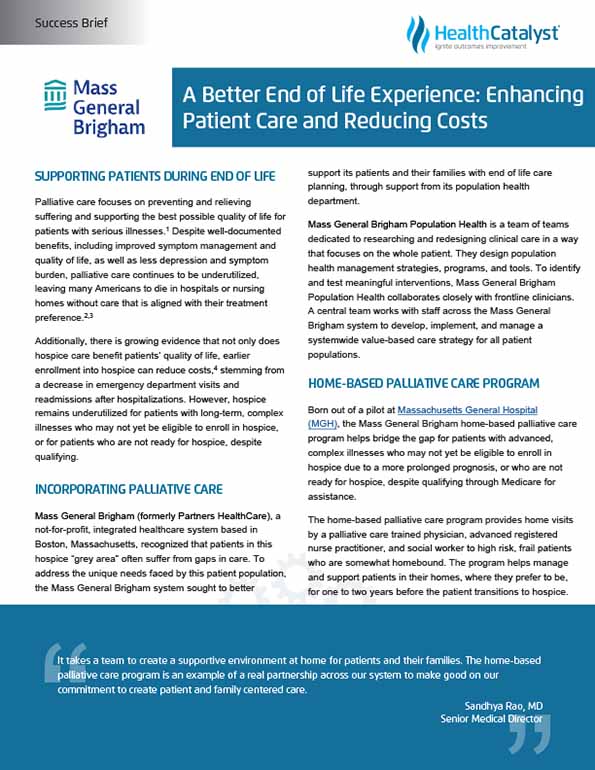By leveraging data from its analytics platform along with a risk predictive model to identify patients who would benefit from its home-based palliative care, Mass General Brigham (formerly Partners HealthCare) has improved the end-of-life care for patients and reduced costs.
Palliative care focuses on preventing and relieving suffering and supporting the best possible quality of life for patients with serious illnesses.1 Despite well-documented benefits, including improved symptom management and quality of life, as well as less depression and symptom burden, palliative care continues to be underutilized, leaving many Americans to die in hospitals or nursing homes without care that is aligned with their treatment preference.2,3
Additionally, there is growing evidence that not only does hospice care benefit patients’ quality of life, earlier enrollment into hospice can reduce costs,4 stemming from a decrease in emergency department visits and readmissions after hospitalizations. However, hospice remains underutilized for patients with long-term, complex illnesses who may not yet be eligible to enroll in hospice, or for patients who are not ready for hospice, despite qualifying.
Mass General Brigham (formerly Partners HealthCare), a not-for-profit, integrated healthcare system based in Boston, Massachusetts, recognized that patients in this hospice “grey area” often suffer from gaps in care. To address the unique needs faced by this patient population, the Mass General Brigham system sought to better support its patients and their families with end-of-life care planning, through support from its population health department.
Mass General Brigham Population Health is a team of teams dedicated to researching and redesigning clinical care in a way that focuses on the whole patient. They design population health management strategies, programs, and tools. To identify and test meaningful interventions, Mass General Brigham Population Health collaborates closely with frontline clinicians. A central team works with staff across the Mass General Brigham system to develop, implement, and manage a systemwide value-based care strategy for all patient populations.
Born out of a pilot at Massachusetts General Hospital (MGH), the Mass General Brigham home-based palliative care program helps bridge the gap for patients with advanced, complex illnesses who may not yet be eligible to enroll in hospice due to a more prolonged prognosis, or who are not ready for hospice, despite qualifying through Medicare for assistance.
The home-based palliative care program provides home visits by a palliative care trained physician, advanced registered nurse practitioner, and social worker to high risk, frail patients who are somewhat homebound. The program helps manage and support patients in their homes, where they prefer to be, for one to two years before the patient transitions to hospice.
Potential patients are identified through the integrated care management program (iCMP) which focuses on chronically ill people with multiple health issues, such as diabetes, heart failure, chronic obstructive pulmonary disease, and dementia. To identify rising risk patients for the iCMP, Mass General Brigham integrates clinical, financial, and operational information using the Health Catalyst® Analytics Platform. The health system then applies claims data from the analytics platform into a risk predictive modeling software, which generates a list of patients who are at an increased risk for rising or high costs in the next 12 months.
Patients in iCMP who require complex pain or symptom management are offered the opportunity to receive home-based palliative care services. The home-based palliative care team develops complex home care plans in collaboration with patients’ primary care physicians and specialists. For example, if a patient develops an infection that requires treatment with intravenous (IV) antibiotics and is unable, or unwilling, to travel to the clinic, the patient can safely receive IV antibiotics at home. This is more satisfying for the patient and avoids costs associated with the primary care visit or with an eventual trip to the emergency department as symptoms worsen. When hospice becomes the best care plan for the patient, the home-based palliative care clinicians support patients and their families through the transition to hospice care.
Mass General Brigham uses the EMR and analytics platform to collect and examine data for evaluating the effectiveness of the program and its impact on costs at the end of life.
Using data from the MGH pilot program, the home-based palliative care program is improving end-of-life care for patients with advanced complex illnesses and reducing expense. Results include:
Mass General Brigham plans to grow the home-based palliative care program and continues to improve its clinicians’ comfort and readiness to have discussions about serious illnesses. The organization plans to continue to pilot additional ways of supporting patients through end-of-life transitions.
“It takes a team to create a supportive environment at home for patients and their families. The home-based palliative care program is an example of a real partnership across our system to make good on our commitment to create patient and family centered care.”
- Sandhya Rao, MD, Senior Medical Director




